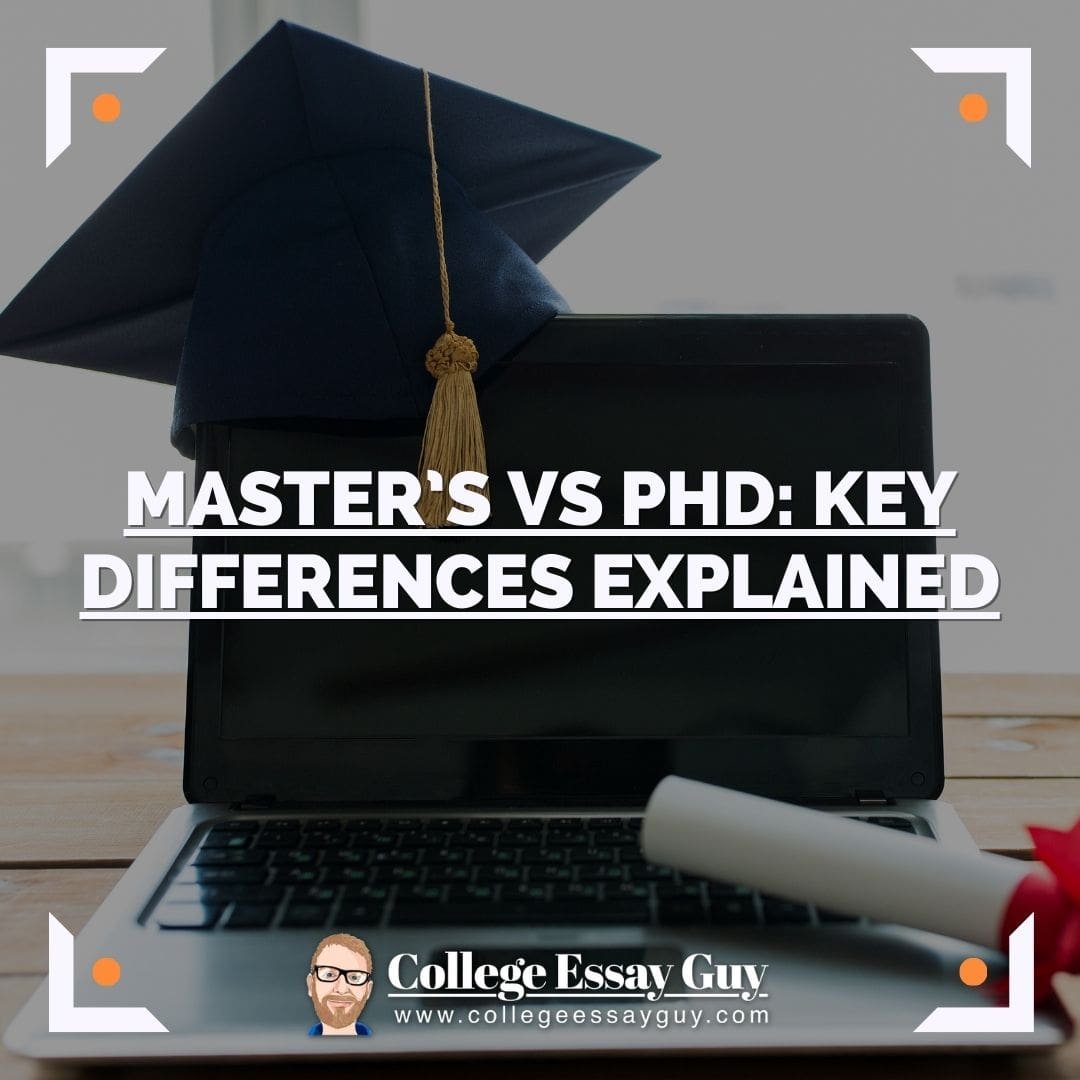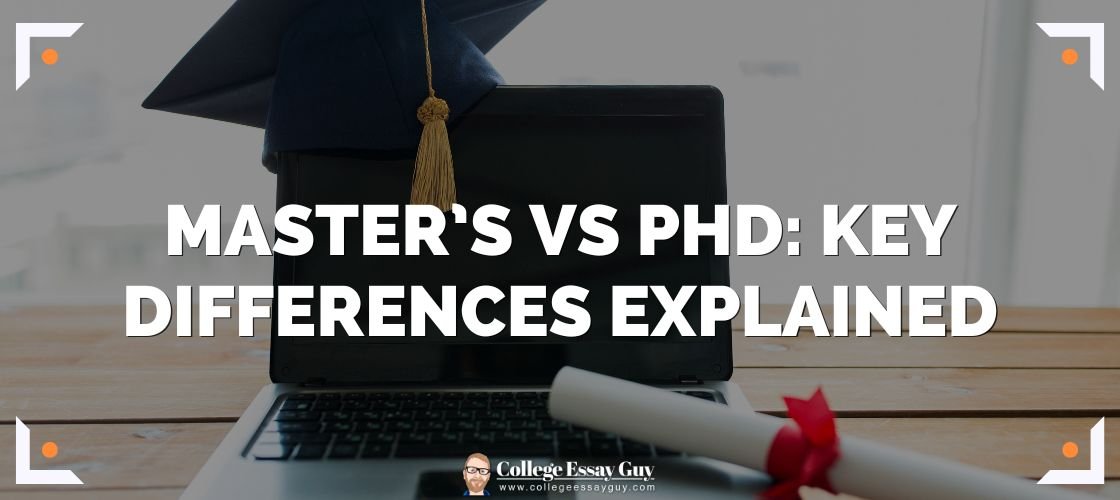Get paid more. Pursue your dream job. Apply for higher-level positions at work. Publish in-depth research that changes the world. Challenge yourself intellectually. Become a full-time nerd.
Yes. Those are all excellent reasons for you to go to graduate school. But Master’s vs PhD program? Which one is better? Which one do you need to achieve your specific goals?
If you don’t know the answers to those three questions, this blog post will help. We’re going to break down the core differences between master’s and PhD programs by looking at:
The differences in focus, coursework, time, and costs
The notable benefits of master’s and PhD programs
How to decide whether getting a master’s degree or PhD is best for you
Answers to frequently asked questions about master’s vs PhD programs
By the end of this blog post, you’ll know how to make an informed decision that aligns with your career aspirations, personal preferences, and academic interests.
Let’s start with the basics.
What is a PhD?
A PhD, short for Doctor of Philosophy, is a postgraduate doctoral degree awarded to graduate students who have demonstrated significant expertise in a specific field through original research. In most cases, a PhD is the highest level degree you can obtain.
PhD programs typically take 3-7 years to complete. The specific requirements for a PhD program depend on the academic discipline and university.
However, most PhD programs require students to engage in advanced coursework, contribute to the existing body of knowledge through original research, and defend their dissertation before a committee of experts.
You might consider applying for a PhD program if you aspire to have a career in academia, where research and teaching are integral components of the job. Additionally, a PhD can open doors to leadership positions in research institutions or relevant industries.
However, it’s important to note that in some cases you may be able to achieve some of those same goals with a Master’s degree alone. So let’s talk about…
What is a Master’s?
A master’s degree is a postgraduate degree awarded to graduate students who have completed advanced coursework and, in many cases, a final project or thesis demonstrating their mastery of the subject matter. Many master’s degree programs are career-oriented—such as an MBA—preparing students to apply their specialized knowledge in professional settings.
Master’s degree programs typically take 1-3 years to complete. Most programs require students to complete in-depth coursework on specific topics within their field of study. Some programs may also include practical experiences, internships, or research projects.
You might consider applying for a Master’s degree program to advance your expertise in a specific field, increase your job prospects, or transition into a new career.
However, you may be limited in pursuing certain roles in fields such as academia with only a Master’s degree.
Master’s vs PhD—Differences in focus and coursework
While both master’s and PhD programs require students to gain an in-depth understanding of the subject matter, there are distinct differences in their focus and requirements.
Master’s program focus and coursework
Master’s programs are often more career-focused, giving students a comprehensive understanding of specific skills and knowledge relevant to a particular profession.
For example, a Master’s in Counseling Psychology prepares graduate students to provide counseling services in diverse settings, such as clinics, schools, or private practices.
PhD program focus and coursework
While still offering some professional development, PhD programs focus more on research. The coursework in a PhD program provides training in the chosen field’s theoretical foundation and research methodologies.
For example, a PhD in Counseling Psychology prepares graduate students for advanced clinical practice. Additionally, it equips students with the skills to conduct research, contribute to the field's theoretical frameworks, and pursue academic careers where research and teaching are integral components.
Master’s vs PhD focus and coursework
| Master’s Program | PhD Program | |
|---|---|---|
| Focus | Career-oriented, practical applications | Research-oriented, original contributions |
| Coursework | Emphasis on specific skills and knowledge | Theoretical foundation, research methodologies |
| Dissertation/Thesis | May require a final project or thesis | Requires original research and a dissertation |
| Career Opportunities | Prepares for professional roles in various industries | Opens doors to academia, research leadership, and specialized roles |
| Outcome | Advanced expertise in a specific field | Contribution to the existing body of knowledge |
Differences in time and costs for Master’s vs PhD
In the US, Master’s programs typically take 1-3 years to complete, whereas PhD programs typically take 3-7 years.
Why such a broad range for PhD programs? The total duration of the program depends on the complexity and scope of the research, the time necessary to conduct original studies, and the requirements for completing a comprehensive dissertation.
Some students also take more time than others to complete PhD programs due to factors such as research challenges, unexpected setbacks, or the need to balance academic pursuits with other commitments.
Many PhD programs in the US also allow students to apply with only a Bachelor’s degree. In this case, students typically spend the first two years completing coursework to obtain a Master’s degree in their field before beginning the more research-intensive phase of the PhD program.
Cost differences
The costs for a Master’s vs PhD program can vary widely depending on the program and university.
On paper, Master’s programs tend to be cheaper than PhD programs. This difference is not surprising considering the shorter duration required to complete a Master’s degree.
However, there is usually more funding and financial aid available for PhD students in the form of fellowships, teaching assistantships, or grants.
For example, the School of Computer Science at Carnegie Mellon University states it “offers all Ph.D. students full financial support while they are in good academic standing in their respective programs.”
The financial support for PhD students usually includes a monthly stipend, which helps cover living expenses. The purpose of the stipend is to allow PhD students to focus on their studies and research without the immediate financial burden associated with pursuing advanced degrees full-time.
Students pursuing a Master’s degree may also be able to receive financial support for their education in the form of fellowships and grants. But, compared to PhD programs, the availability and amount of funding for Master’s students are generally more limited.
Additionally, Master’s students may have to explore external scholarships or rely more on personal funds, part-time work, or student loans to cover their tuition and living expenses.
For more on costs and financial aid, you can check out this guide on how to pay for grad school, and explore options like the Federal Work-Study Program.
Benefits of a Master’s vs PhD
There are distinct advantages to pursuing either a Master’s or a PhD. Here are the most notable benefits of a Master’s vs PhD to help you decide which one is best for you.
Benefits of a Master’s
Specialized expertise. A Master’s degree provides in-depth knowledge and specialized skills in a specific field.
Shorter duration. Typically taking 1-3 years, Master’s programs offer a quicker path to advanced qualifications.
Career advancement. Enhances career prospects and qualifies you for higher-level positions in various industries.
Practical applications. Emphasizes practical applications, making it ideal for those seeking hands-on experiences.
Benefits of a PhD
Research contribution. Allows you to make significant contributions to the existing body of knowledge through original research.
Academic careers. Opens doors to academia, where PhD holders often hold faculty or research positions.
Leadership roles. Qualifies you for leadership roles in research institutions and specialized fields.
Prestige and recognition. PhD graduates are more likely to be recognized as experts in their field, which may lead to increased opportunities.
Should I get a Master’s or PhD?
Whether you get a Master’s or PhD depends entirely on your career goals, the level of expertise you aim to achieve, and how much time you’re willing to commit to higher education.
You should consider getting a Master’s degree if you…
Want to enhance your knowledge and skills in a specific field without committing to a lengthy research project.
Are looking to advance your career in a professional setting and seek specialized expertise.
Value practical applications and hands-on experiences over extensive theoretical research.
Are aiming for roles in industry or positions that don't necessarily require a PhD.
You should consider getting a PhD if you…
Aspire to contribute significantly to the body of knowledge in your field through original research.
Plan to pursue a career in academia, where research and teaching are integral components.
Have a deep passion for a specific research topic and want to explore it extensively.
Seek leadership positions in research institutions or specialized roles that demand advanced research skills and contributions to the field.
FAQ on Master’s vs PhD
Is it better to have a Master’s or PhD?
Neither is inherently better. It depends on your career goals and what you hope to achieve with your degree. A Master’s is suitable for specialized expertise relevant to a particular career path, while a PhD is generally more for those aiming at significant research contributions or academic careers.
Can I get a PhD without a Master’s?
Yes, it's possible, though the typical path involves going from a bachelor's to a Master's degree before pursuing a PhD. However, some PhD programs accept students with only a bachelor's degree, incorporating Master's-level coursework in the first two years.
Does a PhD pay more than a Master’s?
It depends. A PhD may lead to higher-paying roles in some fields, especially in academia or research leadership. However, in certain industries, practical experience and a Master’s degree may be equally or more valued than a PhD.
For example, someone with a Master in Business Administration (MBA) degree will likely receive a higher starting salary than someone with a PhD in English Literature.
On the other hand, someone with a PhD in English Literature will likely receive a higher starting salary and have more professional opportunities than someone with only an MA in English Literature.
Final Thoughts
Only you can decide whether a master’s or PhD program is right for you. Either way, pursuing advanced education should align with your aspirations and long-term objectives.
Make your decision based on your career goals and willingness to commit to a more specialized or research-intensive academic path.
If you're looking for additional resources to help you apply for master’s or PhD programs, we recommend speaking with our graduate school admissions consultants. We can help you craft a strong statement of purpose and navigate the graduate school application process.
So, why wait? Schedule a consultation and take the next step in your grad school journey!
Special thanks to Ameer Drane for writing this blog post.
Ameer is a freelance writer who specializes in writing about college admissions and career development. Prior to freelancing, Ameer worked for three years as a college admissions consultant at a Hong Kong-based education center, helping local high school students prepare and apply for top colleges and universities in the US. He has a B.A. in Latin American Studies from the University of Chicago and an M.A. in Spanish Linguistics from UCLA. When he’s not working, Ameer loves traveling, weight lifting, writing, reading, and learning foreign languages. He currently lives in Bangkok, Thailand.
Top values: Growth / Diversity / Empathy










